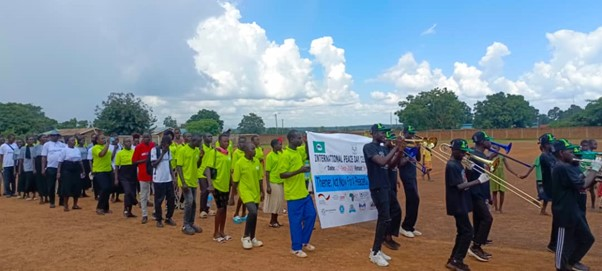Justice Returns to Leer: Mobile Court Brings Hope and Accountability to Conflict-Affected Communities in Unity State
- RSRTF South Sudan
- May 11, 2025
- 4 min read
Updated: May 13, 2025
For the first time in over a decade, residents of southern Unity State have seen the return of formal justice through a mobile court initiative that concluded its proceedings on 8 May 2025. This historic milestone marks a critical step toward accountability and healing for communities long plagued by violence, impunity, and the absence of legal recourse.

For the first time in over a decade, residents of southern Unity State have seen the return of formal justice through a mobile court initiative that concluded its proceedings on 8 May 2025. This historic milestone marks a critical step toward accountability and healing for communities long plagued by violence, impunity, and the absence of legal recourse.
Led jointly by the Unity State government, the Judiciary of South Sudan, and the Ministry of Justice and Constitutional Affairs—with support from the UN Multi-Partner Trust Fund for Reconciliation, Stabilization and Resilience (RSRTF)—the mobile court began its work on 15 April. It heard over 60 cases across Leer, Mayiendit, Panyijjar, and Koch counties, concluding with 57 criminal and civil cases adjudicated.

Among the court’s significant outcomes were 32 criminal case verdicts, resulting in 28 convictions and the release of nine individuals who had been wrongfully incarcerated. Eight convictions were handed down in cases of sexual and gender-based violence (SGBV), including five against members of the security forces—a landmark moment for survivors and victims’ families seeking justice.
“This court has delivered long-awaited justice to communities affected by murder, SGBV, and other serious crimes,” said Guang Cong, Deputy Special Representative of the Secretary-General for UNMISS. “Through the Leer mobile court, we have enabled access to justice for women, children, and marginalized populations. This is essential to ending abuse and exploitation and laying the foundation for durable peace.”

The launch of the court on 15 April drew a crowd of more than 2,000 people, underscoring its significance to the region. Governor Riek Bim Top Long, who officially opened the court, reaffirmed the government’s commitment to establishing permanent judicial presence in Unity State.
“Deploying a mobile court and working towards permanent justice structures ensures that all South Sudanese, regardless of political affiliation, can access justice,” said the Governor. “We are collaborating with the judiciary and our partners to make this a reality.”

Leer County, like much of Unity State, was left without a formal justice system after the outbreak of civil war in 2013 forced the withdrawal of judges. Since then, communities have relied solely on customary courts, which lack the jurisdiction to handle serious crimes such as murder and rape. The mobile court directly addressed this justice vacuum, offering credible and impartial adjudication.
Koch County Paramount Chief William Duop Kueth welcomed the initiative, saying, “Customary courts cannot try murder or rape cases. We need professional judges to do that. This mobile court will help reduce crime and ensure justice is served.”
Women, who have borne the brunt of the conflict and its aftermath, were particularly visible at the court’s inauguration. Twenty-year-old Maria Nyadak expressed hope that the court would mark a turning point for women’s rights.
“We are excited to welcome the mobile court because it will help stop early and forced marriages in our community. Women and girls have suffered for too long without justice,” she said. “We need stronger laws to protect our rights and give us the freedom we deserve.”

To support the court's proceedings, United Nations Mission in South Sudan (UNMISS), one the implementing partners of the trust fund's Southern Unity Area-Based Program led by World Relief, trained 20 new investigators, particularly in handling cases of sexual violence. The court was staffed by two High Court judges, three court clerks, three defence attorneys, a prosecutor, and a victims’ advocate with additional funding from the Royal Norwegian Embassy.
Stella Abayomi, Acting Head of the UNMISS Field Office in Unity, stressed the importance of the court’s role in addressing impunity: “This mobile court addresses crimes beyond the scope of traditional justice, such as conflict-related sexual violence and early marriage. Its presence contributes to justice, accountability, and security in a region long affected by conflict.”
As the mobile court concludes its inaugural session, the hope it has reignited in Unity State is palpable. For the survivors, the wrongly imprisoned, and entire communities denied justice for years, it signals a long-overdue return of law, dignity, and trust in the formal justice system.
The report is based on information by two releases initially issued by UNMISS. First mobile court deployed to Leer concludes successfully and Mobile court brings justice to Leer for the first time in more than a decade




Comments